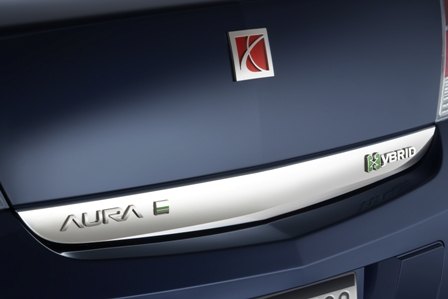GM Mild Hybrids To Return For 2011
Prior to going on television on Monday, I spoke to a GM spokesman in hopes of better understanding the business case for the Volt. Perhaps the most interesting thing he told me was that a major impetus for developing the Volt as an Extended-Range Electric concept was GM’s failure to achieve success with three alt-energy concepts (EV-1, Hydrogen, and yes, E-85 ethanol) due to their need for fueling infrastructure. As we talked, it occurred to me that three other less-than-entirely-successful GM “green car” projects might have helped lead The General down the primrose path to the Volt: GM’s BAS “Mild Hybrid,” the Parallel Hybrid Truck system (PHT), and the V8-based “Two-Mode” hybrid drivetrains. He admitted (somewhat grudgingly) that GM’s hybrid sales had been “disappointing” and that the ambitious Volt project was to some extent motivated by this lack of market success. What he didn’t tell me: GM is bringing back the discontinued mild-hybrid BAS system for 2011.
GM executive director of hybrid and electric powertrain engineering Larry Nitz tells Automotive News [sub] that the BAS or “Belt-Alternator-Starter” hybrid system will become available again starting in the 3rd Quarter of 2011, on one Chinese-market sedan and one US-market mid-size car. The system had previously been available on the Saturn Aura and Vue “Green Line” and the Chevrolet Malibu Hybrid. And though Nitz refused to confirm which models would receive the system, his announcement confirms an earlier report that had the Buick Regal receiving the BAS system in late 2011, and rumors of a BAS revival date back to the Wagoner era.
Nitz also told AN [sub] that the first-generation of BAS drivetrain is currently available in China on the Buick LaCrosse, but made it clear that the US-market revival of BAS would be an improved version of the original system.
Nitz said the electric motor is improved and the electronics and controllers are fully integrated with the conventional gasoline engine. The system will be wedded to GM’s Ecotech engine and a six-speed transmission capable of maximizing performance and fuel savings, he said.
When the mild hybrid was introduced in the Saturn Vue in 2006, it was bolted onto a four-cylinder engine and four-speed transmission not designed for regenerative braking. That mild hybrid produced a 15 percent improvement in fuel economy.
Said Nitz: “It was a forced execution before.”
The new system should offer 20 percent better fuel economy than the Ecotec on which it’s based, and will be one of the early applications of GM’s in-house electric motors. It will still not be able to run on full-electric power, however, which leaves one of the most common criticisms of the system unaddressed. Nitz didn’t give price premium details, but the BAS system previously added $1,600-$1,700 to the price of an equipped car. If the premium remains the same, an improvement in efficiency might help its chances… but the revival of BAS also highlights GM’s hybrid struggles. With the Volt and Mild Hybrids likely to bookend the Prius, GM may just be missing the sweet spot of the green-car market.
More by Edward Niedermeyer
Latest Car Reviews
Read moreLatest Product Reviews
Read moreRecent Comments
- Golden2husky The biggest hurdle for us would be the lack of a good charging network for road tripping as we are at the point in our lives that we will be traveling quite a bit. I'd rather pay more for longer range so the cheaper models would probably not make the cut. Improve the charging infrastructure and I'm certainly going to give one a try. This is more important that a lowish entry price IMHO.
- Add Lightness I have nothing against paying more to get quality (think Toyota vs Chryco) but hate all the silly, non-mandated 'stuff' that automakers load onto cars based on what non-gearhead focus groups tell them they need to have in a car. I blame focus groups for automatic everything and double drivetrains (AWD) that really never gets used 98% of the time. The other 2% of the time, one goes looking for a place to need it to rationanalize the purchase.
- Ger65691276 I would never buy an electric car never in my lifetime I will gas is my way of going electric is not green email
- GregLocock Not as my primary vehicle no, although like all the rich people who are currently subsidised by poor people, I'd buy one as a runabout for town.
- Jalop1991 is this anything like a cheap high end German car?


































Comments
Join the conversation
I have a Malibu Hybrid as a compmany car for the last 43K miles. I watch mpg closely and consistently get 34mpg HWY and avg 31.5mpg overall. The start/stop technology works well going from light to light in traffic. Worst downside, the AC stops working unless you over-ride it manually.
I agree that GM should have never called them "Hybrids". They should be adapting the two-mode system they had in the Tahoe/Yukon to their cars. That's a better much better, more effcient design than that goofy synergy drive Toyota uses. I suspect the Tahoe/Yukon Hybrids would have been a lot more succesful if they hadn't come out just in time for the economy to fall flat on its face.